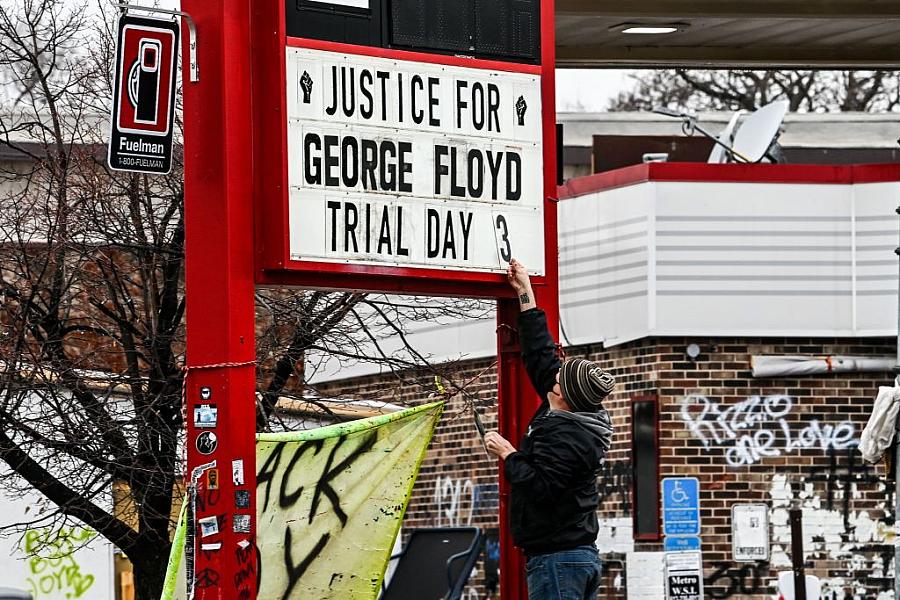As Chauvin trial concludes second week, some avoid coverage as form of self-care

A man changes the number of a sign board at a makeshift memorial of George Floyd before the third day of jury selection begins in the trial of former Minneapolis Police officer Derek Chauvin who is accused of killing Floyd.
(Photo by Chandan Khanna/AFP via Getty Images)
In a 1961 radio interview, author James Baldwin said one of his most famous quotes: “To be a Negro in this country and to be relatively conscious is to be in a state of rage almost all the time.” His words still ring true.
As I write this, the murder trial of former police officer Derek Chauvin concludes its second week.
As a Black woman in America, I made the conscious decision to sit this trial out – and with it the painful reliving of George Floyd’s final moments.
Last year, I couldn’t bring myself to watch the videos of Chauvin kneeling on Floyd’s neck, even as bystanders and Floyd himself pleaded for him to stop. Even still, I’m aware that Floyd used his last breaths to cry out for his mother before he died. I’m also aware that several witnesses broke down in tears on the stand last week, as they described their efforts to intervene on his behalf.
Just as years earlier, I couldn’t bring myself to watch the dashcam footage of Sandra Bland’s arbitrary arrest for a minor traffic violation or security camera footage of her in her cell before she was found hanging by a garbage bag. Nevertheless, I know she had been excited to start a new job at Prairie View A&M University at the time of her death.
Driving while Black is a familiar hazard for my family, with a husband, brothers and other friends and loved ones who have been stopped countless times by police for minor to non-existent law breaking.
Too often, the African American community experiences a cycle of death that starts with police brutality, then protests, and more often than not a trial without a guilty verdict. These trials can exact a mental health toll over time, scholars and experts say. Sometimes you can’t help but wonder: Why am I putting myself through this?
Bucknell University Africana Studies assistant professor Nicholas Brady told his hundreds of Facebook followers, “I don’t know who needs to hear this, but you don’t have to watch the trial.” Professor Brady instead urged his followers to hold the U.S. justice system accountable, rather than raising their stress levels and hinging hope on the trial’s outcome. “For anyone feeling anxiety that is the point of this trial: to make you feel powerless, paralyzed, and frozen waiting for someone else to determine the outcome,” he wrote. “The only way out of this is if we empower OURSELVES to hold this system accountable. Black communities must seize power over the police, abolish it, and build/invest in community organizations that actually care about our safety.”
For Dr. Glenda Gordon, chief medical officer of 180 Health Partners, a provider of behavioral, medical and social care, having her parents over to visit meant that news channels such as CNN were on constantly, making it impossible to avoid the upsetting elements of the trial. “I think that we are living in a time where we are inundated with trauma everywhere,” said Dr. Gordon. “It’s in your personal life, it’s in your public life, and it’s in the fact that we’re still living in a pandemic.”
Dr. Gordon encourages people to take an assessment of all the ways that they may be passively exposed to negative information, including through social media and conversations with loved ones, and be intentional about looking for ways that you can control those channels to protect your energy and wellbeing.
For reporters, there often isn’t the option to look away. You may even be the one charged with writing the headlines or the stories. “For people who are needing to cover the trial, I think you need to be very proactive in terms of getting support to process what you’re experiencing,” says Dr. Gordon. “Because what happens when you experience something traumatic like that is you tend to numb yourself.” That numbness may obscure an awareness that your mental wellbeing may be harmed while covering these topics.
Despite the everyday nature of these repeated spectacles of Black suffering, even numbness fails to protect the psyche. As Black feminist scholar Hortense Spillers eloquently puts it in her essay, “Mama’s Baby Papa’s Maybe,” “I might as well add that the familiarity of this narrative does nothing to appease the hunger of recorded memory, nor does the persistence of the repeated rob these well-known, oft-told events of their power, even now, to startle.”
For reporters and news outlets hoping not to re-traumatize audiences through their coverage of the trial, Dr. Gordon suggests carefully considering what needs to be said and shown, balancing the need for coverage with care for the community.
“There’s a lot of tension in journalism between ratings, impact, and the need to be the first outlet to report something,” said Dr. Gordon. “But if you’re really caring about the population that’s being informed, you have to consider: Does this need to be shown? Does this need to be said? Does this need to be replayed? How many times do we need to see him die?”

